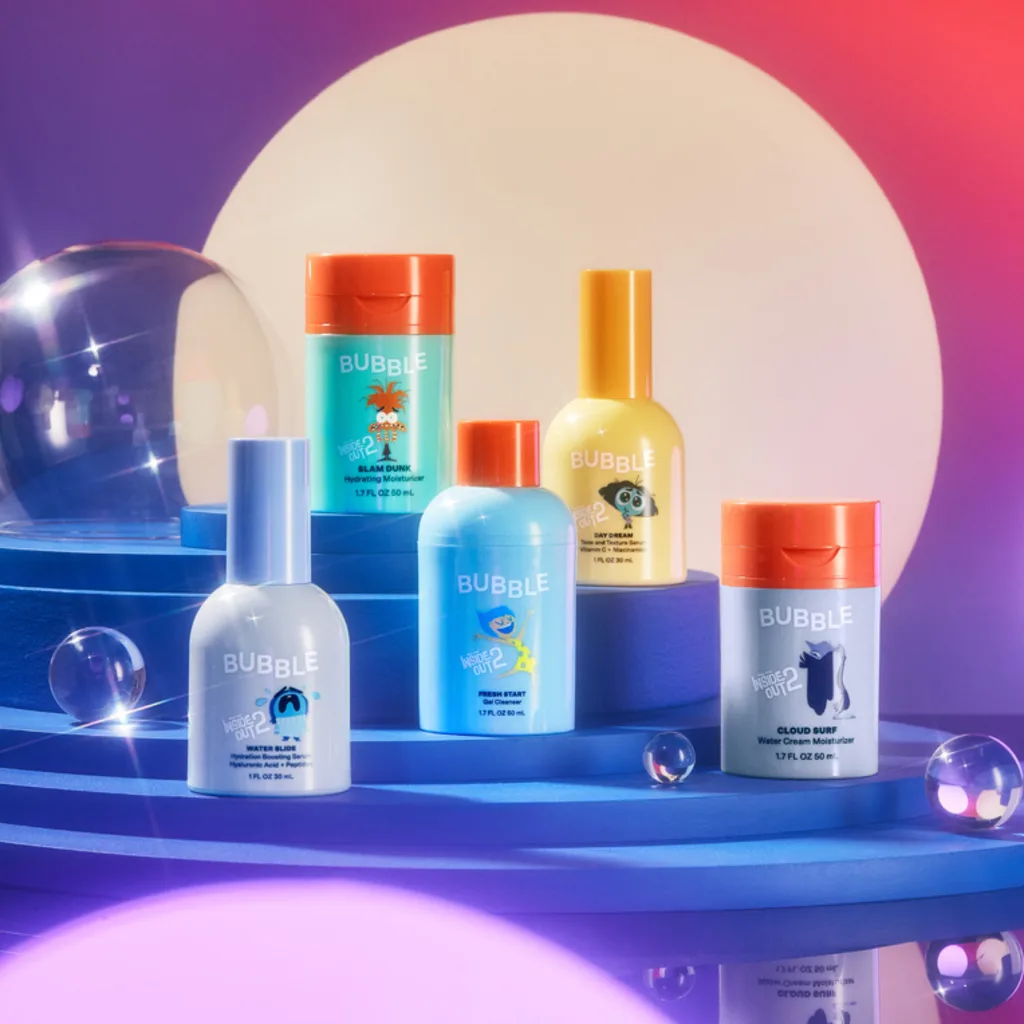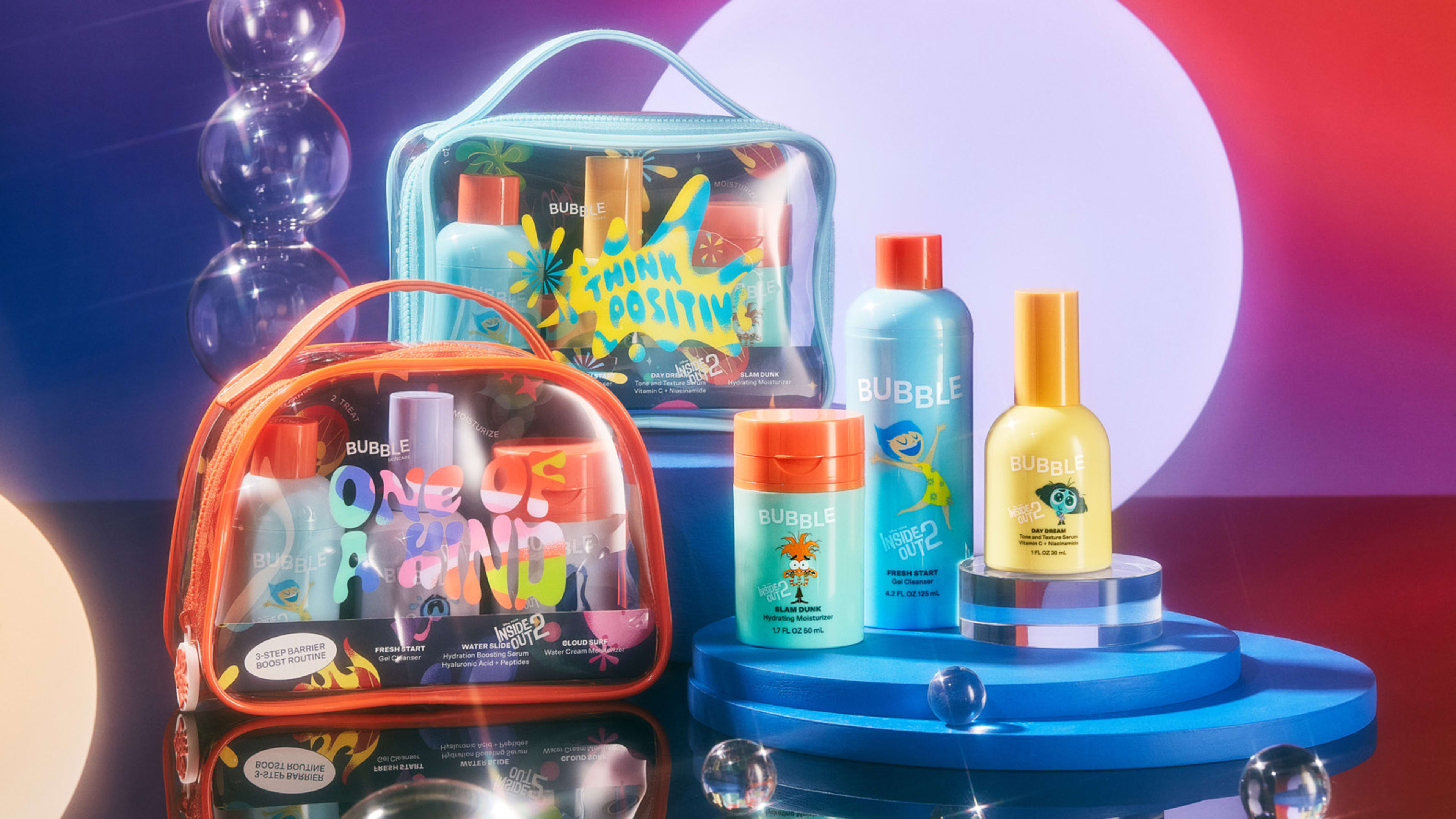Today’s tweens, as you may have heard, are crazy about skincare. Hoards of 8- to 12-year-olds are flooding Sephora en masse. And despite the fact that their skin is as dewy and pore-free as it will ever be in their lifetimes, brands and influencers have somehow convinced these children that they need nine-step skincare regimes.
Disney has realized this is an opportunity. Today, it launches a collaboration with skincare startup Bubble to promote the upcoming animated film Inside Out 2, which will be released June 14. Bubble is launching two skincare kits featuring its bestselling face wash and moisturizers wrapped in new packaging that features characters from the film. It’s another sign that the tween skincare industry is growing rapidly and could drive the growth of the $106.8 billion global skincare market. Market research suggests that the teen personal-care market will grow by 7% annually until 2028, a total increase of $12.27 billion.

This isn’t the first generation of American tweens to show interest in beauty. While other cultures have ceremonies to usher girls into womanhood (like the Quinceañera in Latin America and Ritushuddhi in South Asia), American girls have had a distinctly consumerist approach to growing up. They’ve walked into drugstores, armed with their pocket money, to buy Bonne Bell Lip Smackers and Hard Candy nail polish.
The difference is that today’s young people have access to more information than ever before, thanks to social media. TikTok “skinfluencers” now target tweens with their elaborate beauty rituals. And while in the past, young girls may have been interested primarily in cosmetics, the discourse has now shifted to skincare. This makes a lot of sense from a business perspective. Skincare has higher margins than makeup. And there are now more skincare brands than ever, as the industry has exploded in recent decades.

Shai Eisenman saw this trend unfolding. She launched Bubble Skincare in 2020, creating affordable and high-quality products targeting Gen Z. The products have fun, colorful packaging, with allowance-friendly prices. A gel cleanser costs $10; moisturizer costs $16. (In contrast, Drunk Elephant, also popular with tweens, has products priced three or four times more expensive.)
“We realized there’s a big gap in the market when it comes to what younger consumers are looking to spend,” Eisenman says. “When you’re looking at a price point of under $20, people are stuck with exactly the same stuff I had when I was a teen. The aisles of CVS and Walmart haven’t evolved in a long time when it comes to affordable skincare.”
Eisenman’s business strategy worked. Bubble has grown quickly, both in its online sales and through retail channels, such as Ulta and Walmart. When Disney was thinking about marketing partnerships to promote Inside Out 2, it reached out to Bubble.

In many ways, it makes sense for Disney to tap into the tween skincare market, especially when it comes to this film. It’s been nearly a decade since the first Inside Out movie debuted (to great acclaim, going on to win an Oscar for best animated feature). The central character, Riley, has just turned 13 and is coping with the emotional rollercoaster of adolescence. This is also an age when skincare begins to be an issue in a battle with acne and other hormonal firsts.
Given that Bubble appeals to tweens and sometimes kids even younger, Eisenman has spent a lot of time thinking about how skincare should figure into children’s lives. She argues that products with active ingredients like retinol and vitamin C aren’t appropriate for young kids since they can irritate their skin and strip its outer layers. So the brand makes very clear on Instagram and TikTok that some of its products, like it’s exfoliating serum, are only for people ages 14 and older. Bubble also ensures that all influencers and those in its 25,000-strong focus groups are over 14.
But given that kids are showing interest in skincare at young ages, Eisenman wants to use the brand’s platform to educate them about skincare routines. “We try to make it clear that you don’t need a 20-step routine,” she says. “You just need a gentle cleanser and moisturizer at their age. And the most important thing is sunscreen.”
When Disney reached out to Bubble to create these Inside Out 2 branded kits, Eisenman was intrigued. Riley is now in Bubble’s core demographic. Also, the movie deals with taking care of your mental health, which is something that Bubble tackles in its social media.

But the partnership also opens up questions about whether we should be encouraging young kids to be thinking about beauty at all. The movie will no doubt attract kids who are much younger than Riley, and it’s likely that eight-year-olds perusing the aisles of Walmart with their parents might be drawn to the Disney-branded Bubble products. More broadly, beauty and skincare brands realize there is money to be made by targeting increasingly younger audiences. This is a clever, yet morally dubious, strategy for driving growth.
Eisenman, who has an eight-year-old daughter, has questioned whether or not brands should be pushing to attract ever-younger customers. “I think kids are growing up too fast,” she says. “We should be preserving their childhood as much as possible. But when our kids do get excited about beauty rituals, we want to help them navigate to a good place. I think talking about developing good hygiene habits and always wearing sunscreen is a good place to start.”
Recognize your brand’s excellence by applying to this year’s Brands That Matter Awards before the final deadline, June 7.
Sign up for Brands That Matter notifications here.
